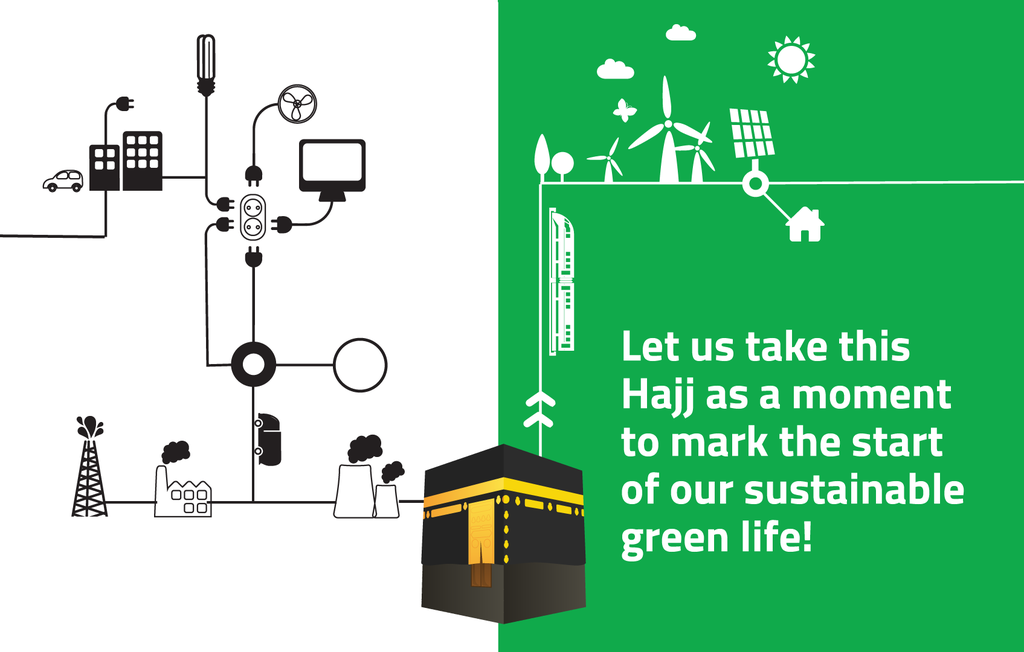As the world is re-experiencing the blessing of Hajj, an opportunity arises today and for the upcoming years to work on preserving this blessing for our children and grandchildren.

Hajj is an extremely important pilgrimage to all Muslims around the world. It represents a sacred spiritual journey that requires great physical and mental determination, and at the same time gives pilgrims the space to connect with their faith and each other. Considering that millions of people go each year, they can be a source of environmental pollution like in any other considerable event. However, this can be managed and avoided as much as possible, so the trips done to Mecca leave a minimal environmental impact to preserve the holy sites associated with Hajj for future generations to experience. This can be the start of an eco-friendly life journey!
Pilgrims can approach Hajj in an eco-friendly manner with the right tips, initiatives, and guides like “The Green Guide For Hajj and Umrah”, ensuring that they protect the environment while being spiritually rewarded. This is especially relevant today with the increasing environmental awareness worldwide.
Sustainability is worship for people staying at home.
With what we are witnessing today from environmental degradation, loss of ecological balance and climate impacts, it has become essential for everyone to commit to a sustainable lifestyle. This applies for pilgrims and others who are not able to take the initiative during Hajj because they will be staying at home for several reasons, including insufficient money to afford the journey and age-related concerns, among others.
For those of us who are not going to Hajj, the spiritual requirement can be met by committing to sustainable living in our day to day life at home and in our communities. This can be done through taking green initiatives such as reducing waste, conserving water and consuming consciously. By doing so, Muslims can help protect our environment but also make a positive impact on the lives of people that surround them, strengthen their faith and deepen their understanding of what it means to be a responsible Muslim. By engaging in green practices, individuals can maintain a sustainable daily life and nurture their spiritual connection with Allah, even if they are unable to undertake the physical journey of Hajj.
Here are some tips to follow!
We can focus on reducing our water consumption. Let us be aware of our water footprint, meaning the amount of water used in our day-to-day activities. This includes our daily consumption of water but also the amount of water needed to produce goods and services. Let us be very careful with how we use this life sustaining resource. We can make sure that we are using the minimum quantity of water for ablution and personal care for example.
Another thing that we can have major control upon is our food consumption and choices. The way food is transported and packaged can cause pollution. Therefore we can lean towards choosing food with less packaging that is grown locally. We can also reduce food waste by buying only what we need for our daily meal plan. These actions can have a positive impact both on our health and environment.
We should also aspire to produce zero waste or reduce it immensely, especially solid waste, by avoiding the use of plastic shopping bags and carrying tote bags instead. We can manage our production and aim at buying only needed and eco-friendly products.
Moreover we can minimize our energy usage and switch off electrical appliances when not in use or avoid lit lights in empty rooms, because reducing energy usage is essential to lower our carbon footprint.
We can take this Hajj as a moment to mark the start of our sustainable green life as a show of gratitude, worship and responsibility. Let us all have Green Hajj and a greener life.
To know more about the tips above and discover more ways for green habits, download and read “The Green Guide For Hajj and Umrah”.
